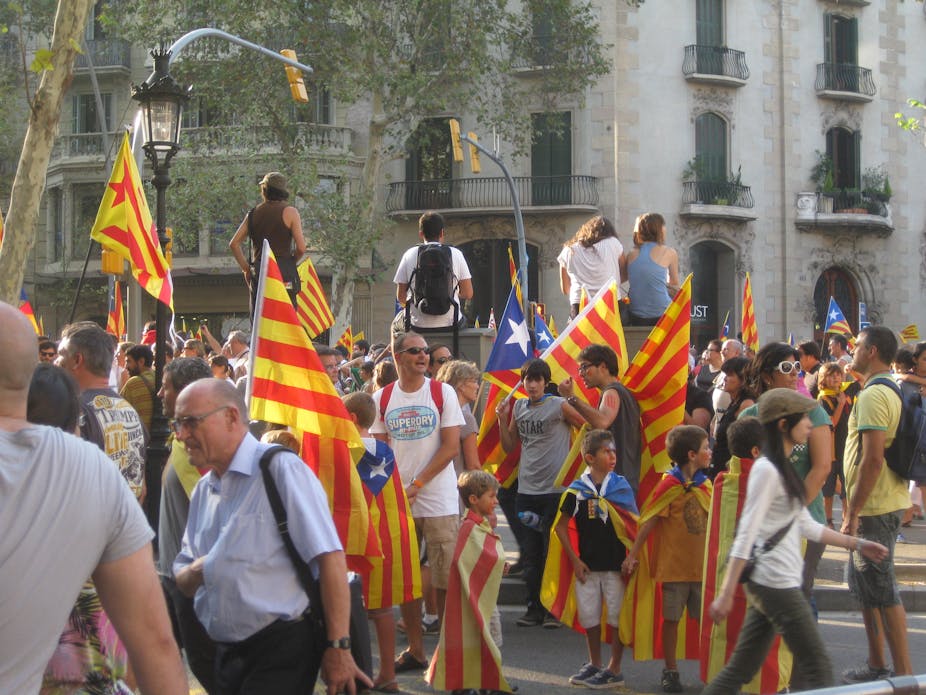In the biggest rally for Catalan independence ever, an estimated crowd of 1.5 million people flooded the city of Barcelona with red-and-yellow striped flags on Catalonia’s national day, the Diada.
Tax laws and lack of financial autonomy have brought Catalan’s disaffection towards the Spanish government to its fullest. And yet, the slogan of the march echoed a unionist aspiration “Catalonia, a new European state”. With the prospect of an economic collapse looming large, the debate over a new hypothetical membership is quickly trespassing national borders.
With the Scottish government aiming to introduce the Referendum Bill in early 2013 as the legal basis for the independence referendum scheduled in 2014 and other independent-minded regions in Europe such as the Basque Country, Flanders or Bavaria closely watching these developments, it remains unclear whether a country that secedes from an EU member would automatically become a new member, or would have to apply for membership.
In a rare response to the question posed by an Italian MEP in late August, European Commission President José Manuel Durão Barroso replied that in the event of secession, any solution “would have to be found and negotiated within the framework of international laws”.
On Tuesday, spokesman of the European Commission Olivier Bailly has further declared in a press conference that “there are two different steps: The process of secession under international law and a request to join the EU as a member state in accordance with EU treaties”.
However, some voices have also invoked the 1978 Vienna Convention on Succession of States in respect of Treaties. Article 34.1 (a) of the Convention states that “when a part or parts of the territory of a State separate to form one or more States, whether or not the predecessor State continues to exist: (a) any treaty in force at the date of the succession of States in respect of the entire territory of the predecessor State continues in force in respect of each successor State so formed”.
As of August 2012, yet, only four EU member states (Czech Republic, Estonia, Slovakia, and Slovenia) and one acceding country (Croatia) had ratified the Convention, which is widely acknowledged as a subsidiary source of customary international law.
In Catalonia, secessionism, European unionism, and globalism are deeply intertwined. Barcelona is a highly internationally connected town, a member of the Glocal Forum, an international organization encouraging peace building and subscribing to a glocalisation vision.
It is perhaps the flagship of Catalan culture in the world, as it was described in The Spirit of Catalonia (1946) by the Oxford exiled professor Josep Trueta as a defense against fascism of Franco’s regime.
What it seems new, is actually old. The ancient legacy of the Catalan legal mind has to be taken into account in reaching some understanding of the way Catalans are handling the present situation.
For centuries, Catalan politicians and civil society have been using negotiation as the primary means to reach agreements that could preserve its national identity. Violence is excluded.
Secession, therefore, should not be simply understood as a rejection of Spain, but as an opportunity to reframe the relations within a new constitutional order in a broader European context. As a matter of fact, some form of asymmetric federalism (the federation or confederation model in which different constituent states possess different powers) has been one of the most pervasive proposals in Catalan politics, a solution that the present Spanish constitution had explicitly blocked in 1978. Could this sort of asymmetric federalism be scaled-up in an enlarged European Union?
According to the Spanish 2010 Constitutional Court ruling on the Catalan Statute, “Catalonia as a nation” and “national reality of Catalonia” have no legal meaning.
The next challenge for the Catalan government is to run an independence referendum, something that Spanish laws have explicitly banned. But as Muriel Casals from Omnium Cultural put yesterday, Catalan parties will have to face a dilemma between Catalan democratic legitimacy and Spanish legality.
In any case, what this recent demonstration has brought to the table is that there is an emergent conflict that is not only related to national legal order but to European and global law as well. Waving the question as a long term strategy by making a permanent denial of the conflict would lead to a blind alley in the present scenario. Glocalised nationalism should not be confused with nationalisms of the 20 century.

